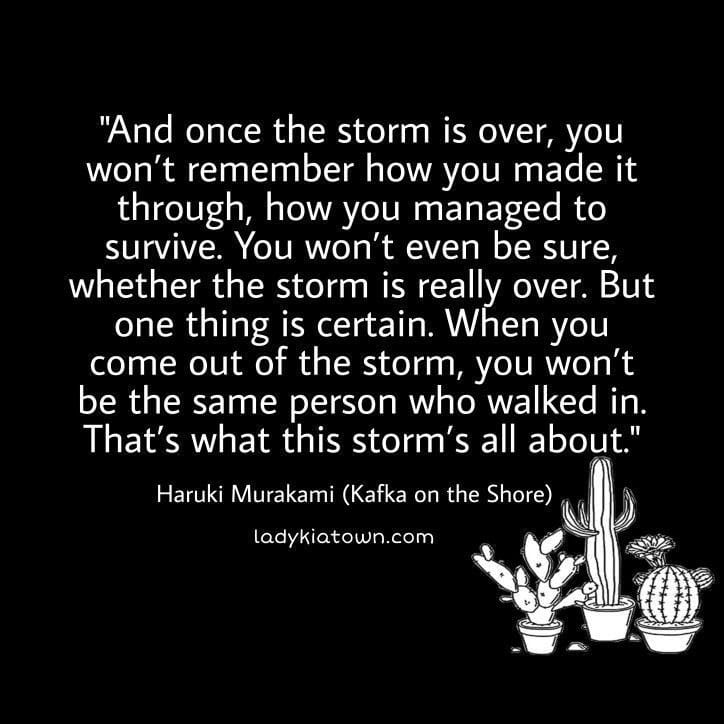Lost Between Worlds: What Kafka on the Shore Taught Me About Being Human
Some books are stories. Others are mirrors. And then there are books like Kafka on the Shore — strange, surreal, and deeply human — that don’t just reflect who you are, but suggest who you might become if you listened more closely to your dreams.
Reading Haruki Murakami is never just reading. It’s drifting — into cat-filled alleys, forgotten forests, metaphysical libraries, and quiet hearts. It’s losing your sense of direction and realizing, maybe that’s the point.
Here’s what stayed with me — not just as quotes, but as quiet truths I now carry.
1. “Memories warm you up from the inside. But they also tear you apart.”

There’s a particular loneliness in memory.
It sneaks up on you in the way a certain song plays in a café, or when the light hits a wall just so. Memories comfort us — yes. They keep us tethered to who we were. But Murakami reminds us that they’re also sharp, bittersweet things. Like the warmth of a fire you can’t get too close to.
When I think of this line, I think of all the versions of myself I’ve had to leave behind — not because I wanted to, but because I had to. And they still ache, quietly, in the background.
2. “Anyone who falls in love is searching for the missing pieces of themselves.”

This one stayed with me like a secret.
It made me think of how often we treat love like a discovery, when in fact, it’s more like excavation. We fall for people not just because of who they are — but because of what they wake up inside us.
Sometimes it’s a piece we’ve been searching for.
Sometimes, it’s something we didn’t know was missing until we saw it in their eyes.
3. “Lost opportunities, lost possibilities, feelings we can never get back. That’s part of what it means to be alive.”
Murakami doesn’t offer band-aids for grief or regret.
He offers companionship. The quiet kind. The kind that sits beside you and says: I know. This quote doesn’t try to heal you — it just validates the ache. And sometimes, that’s all we really need.
Life is stitched together from the moments that didn’t happen, just as much as from the ones that did. It’s okay to mourn them.
4. “If you remember me, then I don’t care if everyone else forgets.”

We spend so much of our lives trying to be remembered — to leave a mark, to matter. But maybe legacy isn’t always written in grand gestures. Maybe it’s something smaller. Quieter.
This quote reminds me that it only takes one person really seeing you — truly seeing you — to make it all feel worthwhile.
And that’s enough.
That’s always been enough.
5. “Closing your eyes isn’t going to change anything. Nothing’s going to disappear just because you can’t see what’s going on.”
This line hits with quiet insistence.
It reminds me how often I try to ignore pain, delay decisions, or hope that time alone will do the work of healing. But Murakami doesn’t allow for that kind of escapism. He gently insists: you can’t vanish reality by pretending it isn’t there.
It’s a call to presence — not just with joy, but with discomfort. With everything we’d rather not face. And somehow, it doesn’t feel harsh. It feels like a hand on your shoulder saying, You’re strong enough for this. Keep your eyes open.
6. “In everybody’s life there’s a point of no return. And in a very few cases, a point where you can’t go forward anymore.”

Some moments in life divide everything into “before” and “after.”
You can’t unsee what you’ve seen. You can’t unfeel what happened. But even harder are the moments where you can’t seem to move forward — stuck in between who you were and who you’re trying to be.
Murakami captures this liminal state with painful precision. He doesn’t rush to the next chapter — he lingers in that moment of paralysis and listens. And that’s where healing begins.
7. “No matter how much suffering you went through, you never wanted to let go of those memories.”


9. “But the longer I’ve lived, the more I’ve lost what’s inside me – and ended up empty.”

In Kafka on the Shore, this line expresses the emotional toll of life over time. The character is reflecting on how aging or enduring life’s hardships can gradually strip away one’s inner essence — such as passion, dreams, or innocence — leaving a sense of inner emptiness.
10. “And once the storm is over, you won’t remember how you made it through, how you managed to survive. You won’t even be sure, whether the storm is really over. But one thing is certain. When you come out of the storm, you won’t be the same person who walked in. That’s what this storm’s all about.”


It means that time is priceless — unlike money, it can’t be earned, bought, or saved. Once it’s gone, it’s gone forever, making it more valuable than any amount of wealth.
🌊 Kafka’s Shore
Kafka on the Shore doesn’t explain itself.
It doesn’t ask you to understand. It asks you to feel — to sit in the mystery, to walk the blurred line between dreams and daylight, to let your soul stretch a little in the unfamiliar.
What I love most is that the book doesn’t demand clarity.
It offers presence.
And sometimes, presence is all we need.









